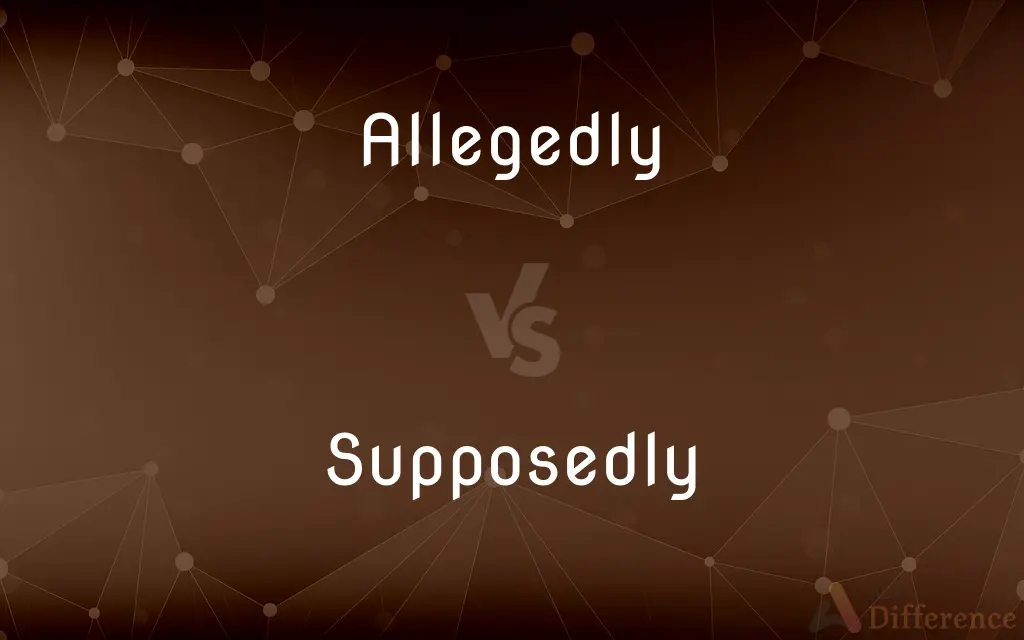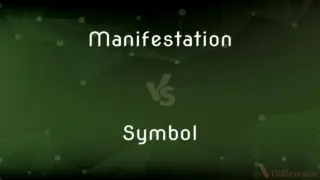Allegedly vs. Supposedly — What's the Difference?
By Maham Liaqat & Fiza Rafique — Updated on March 25, 2024
"Allegedly" is used when something is claimed but not proven, while "supposedly" suggests something is believed or accepted by common opinion but may lack verification.

Difference Between Allegedly and Supposedly
Table of Contents
ADVERTISEMENT
Key Differences
"Allegedly" is often used in legal or formal contexts to indicate that a statement or claim has been made, usually regarding someone's actions or events, but it has not yet been proven to be true. It's a way to convey that there is an accusation or assertion without taking a stance on its validity. On the other hand, "supposedly" is used to express doubt or skepticism about the truth of a statement or to indicate that something is presumed to be true based on common belief or hearsay, but without direct evidence. It can imply a level of uncertainty or question the authenticity of the claim.
While "allegedly" is primarily associated with legal language and is used to refer to specific accusations or claims, "supposedly" is more colloquial and relates to general beliefs or assumptions about situations, events, or characteristics. The use of "allegedly" tends to be more cautious and is aimed at avoiding legal repercussions by not asserting the truth of a claim, whereas "supposedly" reflects more on the speaker's or the general public's perception of the truth.
In the context of reporting or discussing unverified information, "allegedly" is preferred when referring to specific allegations or claims, especially in serious matters such as criminal activities or legal issues. "Supposedly," however, is more suitable for casual or less serious contexts, where the information being discussed is part of rumors, assumptions, or widely held beliefs without a strong foundation in proven facts.
The choice between "allegedly" and "supposedly" can significantly impact the tone and implication of a statement. Using "allegedly" signals a careful approach to unverified claims, especially in sensitive or legal matters, while "supposedly" can introduce a tone of skepticism or imply that the information is not fully reliable, often based on hearsay or popular belief.
Comparison Chart
Context
Legal, formal
Informal, colloquial
ADVERTISEMENT
Implication
Claim made but not proven
Believed or accepted without verification
Usage
Referring to specific accusations or claims
Relaying widely believed or reported information
Tone
Neutral, cautious
Skeptical, questioning
Suitability
Serious matters, especially legal issues
Casual or less serious contexts
Compare with Definitions
Allegedly
Claimed to be the case but not yet proven.
The suspect was allegedly seen at the scene of the crime.
Supposedly
Accepted or believed to be true on the basis of hearsay.
Supposedly, the restaurant is the best in town according to reviews.
Allegedly
Often used in legal contexts to maintain neutrality.
The defendant is allegedly responsible for the damages.
Supposedly
Used to indicate skepticism or doubt about the truth.
Supposedly, he's an expert, but I've seen no evidence of that.
Allegedly
Indicates caution in relaying unverified claims.
The company is allegedly planning to merge with its competitor.
Supposedly
Relates to what is generally assumed or believed.
The park is supposedly haunted, according to local legends.
Allegedly
Suggests that the information comes from a third-party claim.
The technology was allegedly developed using proprietary information.
Supposedly
Conveys information based on common opinion rather than fact.
Supposedly, the product will launch next month, but there's no official date.
Allegedly
Used to convey that information is based on allegations.
The artwork was allegedly stolen from the museum last night.
Supposedly
Suggests a lack of direct verification or evidence.
She's supposedly retiring soon, but she hasn't announced anything.
Allegedly
Represented as existing or as being as described but not so proved; supposed
An alleged conspiracy.
An alleged traitor.
An alleged victim of a crime.
Supposedly
(also sə-pōzĭd) Presumed to be true or real without conclusive evidence
A supposed spy.
The supposed decline of culture.
Allegedly
According to someone's allegation.
The suspect was allegedly involved in the robbery, but his alibi placed him in another state at the time.
Supposedly
(also sə-pōst) Intended
Medication that is supposed to relieve pain.
Allegedly
According to someone's conspicuous impressions (which could subsequently be alleged).
The game is allegedly exciting.
Supposedly
Required
He is supposed to go to the store.
Allegedly
According to what has been alleged;
He was on trial for allegedly murdering his wife
Supposedly
Permitted
We are not supposed to smoke here.
Supposedly
Firmly believed; expected
You're supposed to be my friend.
Supposedly
As a matter of supposition; in the beliefs or according to the claims of some people.
People from other planets have supposedly visited Earth in flying saucers.
According to your testimony, you were supposedly at home watching TV when the murder occurred.
Supposedly
Believed or reputed to be the case
Common Curiosities
How does "allegedly" protect against defamation?
By indicating that the information is a claim and not a confirmed fact, it avoids stating unproven allegations as truth.
Why might someone choose "supposedly" over "allegedly"?
To reflect a more informal tone or when discussing general beliefs rather than specific accusations.
How do "allegedly" and "supposedly" affect the perception of information?
"Allegedly" tends to lend a cautious tone, while "supposedly" can introduce doubt or imply less reliability.
s "allegedly" only used in legal situations?
Primarily, yes, though it can also be used more broadly to indicate unproven claims in serious contexts.
Can the misuse of "allegedly" and "supposedly" impact credibility?
Yes, using them incorrectly can mislead the audience or misrepresent the certainty of the information.
Can "supposedly" imply disbelief?
Yes, it can convey a sense of skepticism or imply that the speaker is questioning the validity of the information.
How does the choice between these words influence legal outcomes?
In legal contexts, "allegedly" is crucial for maintaining objectivity and avoiding prejudgment.
Are there situations where both "allegedly" and "supposedly" can be used interchangeably?
While they might be used similarly in casual speech, their nuances mean they're not always interchangeable, especially in formal or serious contexts.
What are the implications of using "allegedly" in social media posts?
It indicates that the information is not confirmed, which can be important for clarity and avoiding the spread of misinformation.
Is it appropriate to use "supposedly" in formal writing?
It depends on the context, but in many cases, a more precise term might be preferred to maintain formality.
What is the impact of these words on journalistic integrity?
Their correct use is essential for responsible journalism, indicating the status of information as unverified or not officially confirmed.
Can "supposedly" be used to soften a statement?
Yes, it can indicate that the speaker is relaying information without fully committing to its accuracy.
How do "allegedly" and "supposedly" function in academic writing?
"Allegedly" can be used to refer to unproven theories or hypotheses, while "supposedly" might be less common due to the need for precision.
Share Your Discovery

Previous Comparison
Manifestation vs. Symbol
Next Comparison
Glamour vs. AllureAuthor Spotlight
Written by
Maham LiaqatCo-written by
Fiza RafiqueFiza Rafique is a skilled content writer at AskDifference.com, where she meticulously refines and enhances written pieces. Drawing from her vast editorial expertise, Fiza ensures clarity, accuracy, and precision in every article. Passionate about language, she continually seeks to elevate the quality of content for readers worldwide.















































